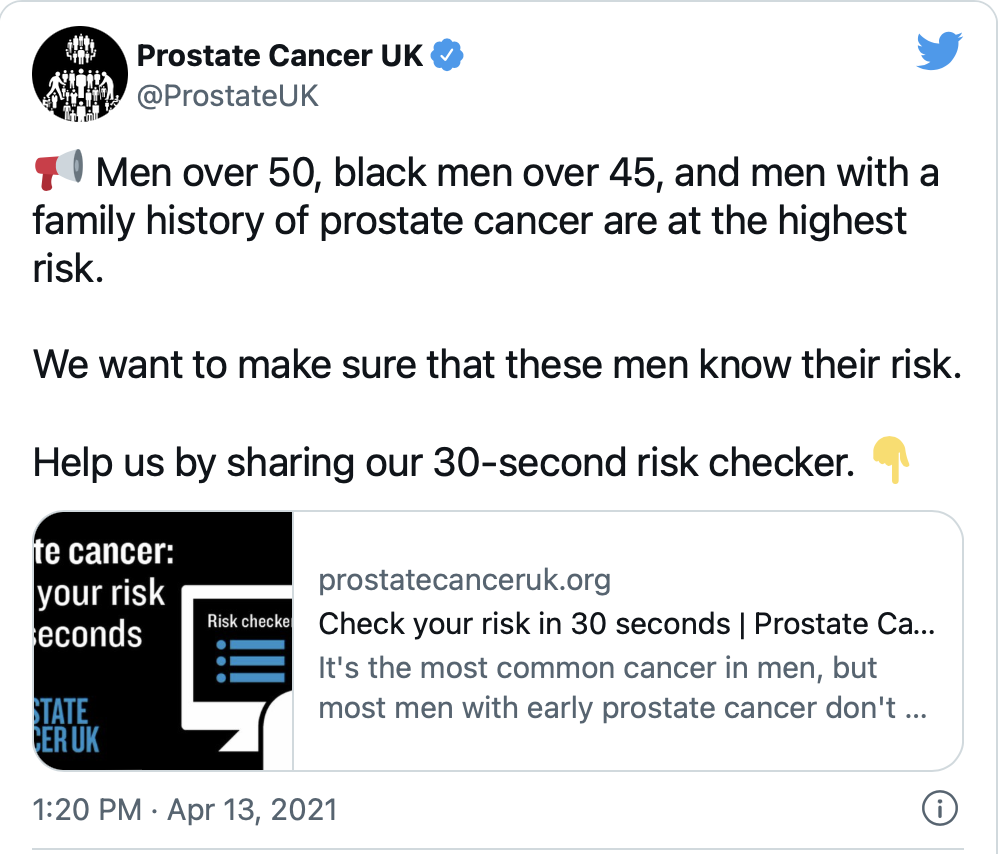
Thousands of men could have undiagnosed prostate cancer, potentially needing urgent treatment.
Prostate Cancer UK (PCUK, prostatecanceruk.org) has warned around 14,000 men in England might be at risk, as it is concerned the number of people in treatment is lower than expected in pre-pandemic numbers.
As symptoms tend not to appear until the disease has spread, PCUK is campaigning for men to use its risk assessment tool – which taking only 30 seconds.

Stephen Fry was diagnosed with prostate cancer in 2017 after a routine health check – he’s backing PCUK’s campaign, saying: “As you can imagine, I was pretty knocked back when I received a diagnosis of prostate cancer, particularly as I had no symptoms to indicate anything was wrong – something I later learned is very common. Thankfully it was caught early, making it more treatable.
“That’s why I’d urge you to check your risk and speak to your GP if you have any concerns – even if you feel completely well, as I did.”
Here’s everything you need to know about prostate cancer…
Where the prostate is
According to PCUK, prostate cancer starts in the prostate gland, which is at the base of the bladder and is about the size of a walnut. The prostate gland gets bigger as you age, and its main job is to make the thick white fluid that creates semen when mixed with sperm produced by the testicles.
Initially there don’t tend to be symptoms
Localised prostate cancer (contained inside the prostate) doesn’t usually trigger any symptoms. Signs don’t normally appear until the prostate is big enough to affect the urethra (the tube that carries urine from the bladder out of the penis).
If symptoms do kick in, they’ll likely affect you when urinating
If the prostate does become enlarged, it may lead to an increased need to wee, straining while you wee, a weak flow, dribbling urine after you finish, and a feeling that your bladder hasn’t fully emptied.
PCUK says that while some men might have urinary problems, “these can be mild and happen over many years, and may be a sign of a benign prostate problem, rather than prostate cancer.” Another cause of such symptoms can be a non-cancerous enlarged prostate, which is very common. But anyone with any symptoms should get them checked by a GP.
Further symptoms include…
Other symptoms of prostate cancer can include lower back pain or rectal pain or discomfort, as well as difficulties relating to sex, such as blood in the semen, pain when ejaculating or erectile dysfunction. Signs of more advanced cancer can include bone and back pain, a loss of appetite, testicular pain and unintentional weight loss.
How it’s diagnosed
Men with symptoms may have a Prostate Specific Antigen (PSA) blood test, as those with prostate cancer may have a raised PSA level. However, Cancer Research UK (CRUK, cancerresearchuk.org) says PSA levels can also be raised in benign prostate conditions, or if you have an infection, so a diagnosis of cancer isn’t usually made on a PSA test result alone. Men may also have an examination of the rectum, which involves a doctor feeling inside the rectum using their finger. There may be scans and a biopsy too.
Not everyone needs treatment
Some prostate cancers grow too slowly to cause any problems or affect how long you live, and because of this, many men with prostate cancer will never need any treatment. However, some prostate cancers grow quickly and are more likely to spread, so do need treatment.
The risk factors and who gets it
You’re more at risk of prostate cancer if you’re over 50, if a close relative (father or brother) has had prostate cancer, or if you’re black. One in eight men will be diagnosed with prostate cancer in their lifetime, says PCUK, and this rises to one in four for black men, who are more susceptible aged 45 and over. One man dies from prostate cancer every 45 minutes, according to PCUK.
What you can do to decrease your risk
CRUK says there’s evidence that being active might help to lower the risk of developing prostate cancer. Plus, being overweight or obese increases your risk of advanced prostate cancer. Sticking to recommended alcohol limits, eating a healthy, balanced diet and not smoking are all thought to be potentially beneficial too.
Prostate Cancer UK specialist nurses are available on 0800 074 8383. If you’re concerned about your prostate health and family history, always speak to your GP.

 Our Five Favourite Twists In Cinema
Our Five Favourite Twists In Cinema
 Five Incredible Desserts From Around The World
Five Incredible Desserts From Around The World
 Lighten the Technology Overload
Lighten the Technology Overload
 Bucket List Travel Experiences
Bucket List Travel Experiences
 Our Five Favourite Time-Travel Movies
Our Five Favourite Time-Travel Movies